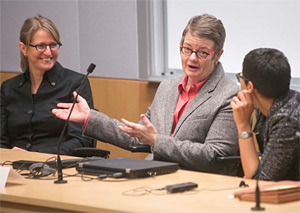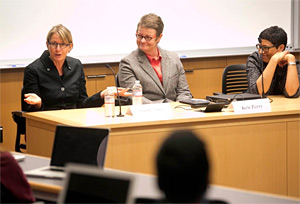
By Susan Gluss
It’s been a tough four years for Kristin Perry and Sandra Stier. The unassuming couple never expected to become figureheads in the battle to legalize same-sex marriage. But the case that began as a legal challenge to California’s Proposition 8, which outlawed marriage for same-sex couples, has thrust them into the international limelight.
“I never dreamt I’d be in court,” said Stier, “let alone testifying about my personal life” in a room full of antagonists. But it’s a role she and her partner of a dozen years have accepted with strong conviction. “We are fearless,” said Perry.
The two litigants shared details of their legal and personal journey with 65 rapt students in Professor Melissa Murray’s Family Law class. Murray said their case, Hollingsworth v. Perry, now pending before the U.S. Supreme Court, could be as significant to civil rights law as Brown v. Board of Education, or Roe v. Wade. It’s no accident, she said, that the landmark case evolved in California.
“California is ground zero for so many family law issues,” Murray said. “We were the first state in the union to invalidate laws prohibiting interracial marriages. We were the first state that created the concept of no-fault divorce, and Berkeley was the first city in the country to establish domestic partnership regime. We are always on the cutting edge of these important family law issues, and our curriculum reflects that fact.”
Perry and Stier married in 2004 after then-San Francisco Mayor Gavin Newson ordered the city to issue marriage licenses to gay couples. Six months later, their marriage was invalidated by the California Supreme Court. Although the Court eventually ruled same-sex marriage legal in 2008, they chose not to re-marry, “afraid it would be undone again,” said Stier. Then came Prop. 8. And the fury and disappointment came to a head.
When invited by a legal team to challenge the measure, the women agreed to be plaintiffs—once their four children backed that decision “completely, 100 percent,” said Stier. The team eventually snagged attorneys Ted Olson ’65 and David Boies, the opposing lawyers in Bush v. Gore, to argue their case.
But it hasn’t been easy—far from it. The four years of litigation has taken an inordinate amount of time, as well as an emotional toll. Perry still flinches when she recounts the worst moments. “It was so difficult to hear people say that we shouldn’t be parents; that we violated traditional and religious values, and that we were harmful to society,” she said.
Balancing litigation with activism
Perry and Stier’s story elicited fervid empathy from Berkeley Law students. Sean Darling-Hammond ’14 described the two as “awe-inspiring individuals at the vanguard of creating a society that many of us envision and aspire to.” Recounting his own parents’ interracial marriage and the social stigma they suffered, he lauded Perry and Stier’s willingness to be wholly “emotional and honest with those that condone bigotry.”

Titilayo Tinubu ’13 asked the couple about the relative value of activism and litigation, trying to determine which tactic was most effective. In response, Stier admitted she was rarely involved politically before Prop. 8, but said the case taught her the power of activism. “You understand an issue more by paying attention to the advocacy,” she said. It goes “hand-in-hand” with litigation, and “each has its place in time.”
As oral arguments approach for Hollingsworth v. Perry, the women are cautiously optimistic. “It’s risky,” said Perry, the named plaintiff in the case. “There’s a lot of pressure on our legal team to win. The risk of setting back legal rights for generations ahead sits squarely on their shoulders.”
Despite the challenges, Perry perseveres in order to achieve “a bigger right for everyone else.” She reiterates that Prop. 8 is discriminatory because it denies the constitutional right to equal protection. “If the Supreme Court doesn’t do the right thing now, it will eventually,” she said. If not, the ruling will be a “blemish” on its record.
Why persist in the face of such tough odds: a High Court described as the most conservative in living memory?
“A marriage, a wedding means something,” said Perry. “A domestic partnership is a legal arrangement for financial security only. It’s not the same, and it’s not good enough.”
“Every single one of our kids has been challenged by his peers,” said Stier. “Every single one has had to come out as kids of gay parents. It’s embarrassing to them, and to everyone who loves us. At least if the government supports same-sex marriage, it’ll make it easier for kids and families that are in the same boat.”
Even if they win their case, however, Perry acknowledged that “it will take generations for same-sex marriages to be fully accepted. There will still be bullying and hate crimes—problems that this case alone won’t solve.”
As the class concluded, students rose in a standing ovation, and Stier and Perry left to face their next legal battle.